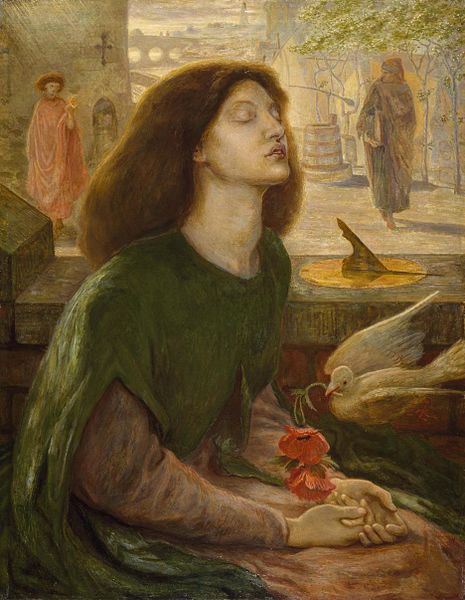Spiritual Sunday—Valentine’s Day
As Valentine’s Day this year falls on a Sunday, I choose this opportunity to explore the relationship between Love’s physical and spiritual sides. That it has these two sides has long been regarded with suspicion by those Christians who see a commingling of the bestial and the angelic. Dante and Milton surprise, however, by finding a way to reconcile these supposed opposites.
Erotic love is a key component in The Divine Comedy, with Beatrice Portinari, a woman that Dante idealized from afar and who died young, serving as his guide through Paradise. As Dante came to see it, erotic love does not take us away from God but rather gives us an inkling of divine love. “The glory who Him who moves all things/ Impenetrates the universe,” Dante writes to open Paradiso. To catch a glimpse of this force, Dante draws on the love he feels for Beatrice.
Classical reason, represented by Virgil, won’t allow him to look directly at the sun. But Love will.
I’ve been reading a blog essay by one Mark Vernon, a psychotherapist, who believes a key turning point in Dante’s understanding of love occurs in Canto 9 of Purgatorio. There, at the threshold of Purgatory, Dante dreams a lustful dream but is then carried up into Purgatory by Lucia, one of three women looking out for him (the Virgin Mary being the third). As Vernon sees it,
The implication is that the transformation of eros from its dark manifestations to its true character requires him to work on his perceptions. He must hold in mind both images — one of violent and lustful snatching, the other of divine embrace and carriage. In so doing, the possessive character of eros that currently dominates his mind is revealed by the dream, and it might give way to the dominant character of divine love, which is of dynamic participation. As it is summarized by the famous last line of Paradiso, this is “the love that moves the sun and other stars.”
We see the shift in Paradise Lost, only in the other direction. There, however, we don’t just see love as the idealization of a woman. We also see it as actual sex.
In Book IV Milton describes Adam and Eve arriving at their special bower holding hands and, of course, naked. The first action is to offer up spontaneous prayers to God (“adoration pure/ Which God likes best”). Their next is to make love. As Milton circuitously puts it, they do not refuse the rites mysterious of connubial love—which is to say, they do not not have sex:
Thus at their shady lodge arrived, both stood
Both turned and under op’n sky adored
The God that made both sky, air, earth and heav’n
Which they beheld…This said unanimous, and other rites
Observing none, but adoration pure
Which God likes best, into their inmost bower
Handed they went; and eased the putting off
These troublesome disguises which we wear,
Straight side by side were laid, nor turned I ween
Adam from his fair Spouse, nor Eve the Rites
Mysterious of connubial Love refused…
Because of orthodox Christianity’s suspicion of sex, Milton at this point gets defensive. It’s only after Adam and Eve eat of the fruit, he insists, that beautiful sex becomes evil lust. Before, it’s all good. “Our Maker bids increase, who bids abstain/ But our Destroyer, foe to God and Man?,” he declares defiantly. Then he delivers a paean to wedded love,
Hail wedded Love, mysterious Law, true source
Of human offspring, sole propriety,
In Paradise of all things common else…
Later in the passage he calls the marriage bed a “perpetual fountain of domestic sweets” and romantically says,
Here Love his golden shafts employs, here lights
His constant lamp, and waves his purple wings,
Reigns here and revels…
Today being Valentine’s day, I point out that their love bower is a florist’s dream:
[T]he roof
Of thickest covert was inwoven shade
Laurel and myrtle, and what higher grew
Of firm and fragrant leaf; on either side [ 695 ]
Acanthus, and each odorous bushy shrub
Fenced up the verdant wall; each beauteous flower,
Iris all hues, roses, and jessamine
Reared high their flourished heads between, and wrought
Mosaic; underfoot the violet,
Crocus, and hyacinth with rich inlay
Embroidered the ground, more colored then with stone
Of costliest emblem…
Along with flowers and “sweet-smelling herbs,” they even have the ultimate stereo system:
Here in close recess
With flowers, garlands, and sweet-smelling herbs
Espoused Eve decked first his nuptial
Bed, and heavenlyly choirs the Hymenaean sung,
What day the genial angel to our sire
Brought her in naked beauty more adorned
More lovely than Pandora, whom the Gods
Endowed with all their gifts…
The music, we learn, is creation singing its joy to God. Although Adam and Even could hear this music clearly before the fall, Milton assures us we can still hear it if we listen closely enough:
Millions of spiritual creatures walk the earth
Unseen, both when we wake, and when we sleep:
All these with ceaseless praise [God’s] works behold
Both day and night: How often from the steep
Of echoing hill or thicket have we heard
Celestial voices to the midnight air,
Sole, or responsive each to others note,
Singing their great Creator? oft in bands
While they keep watch, or nightly rounding walk,
With heavenly touch of instrumental sounds
In full harmonic number joined, their songs
Divide the night, and lift our thoughts to Heaven.
As Jane Hirshfield writes in the poem I shared last Sunday, the spiritual shines through the physical if we open ourselves to it, and the same can occur with the act of sex. Milton may have been a puritan, but his poetic insights look him deeper into the nature of the universe than theological doctrine. Same for Dante.


